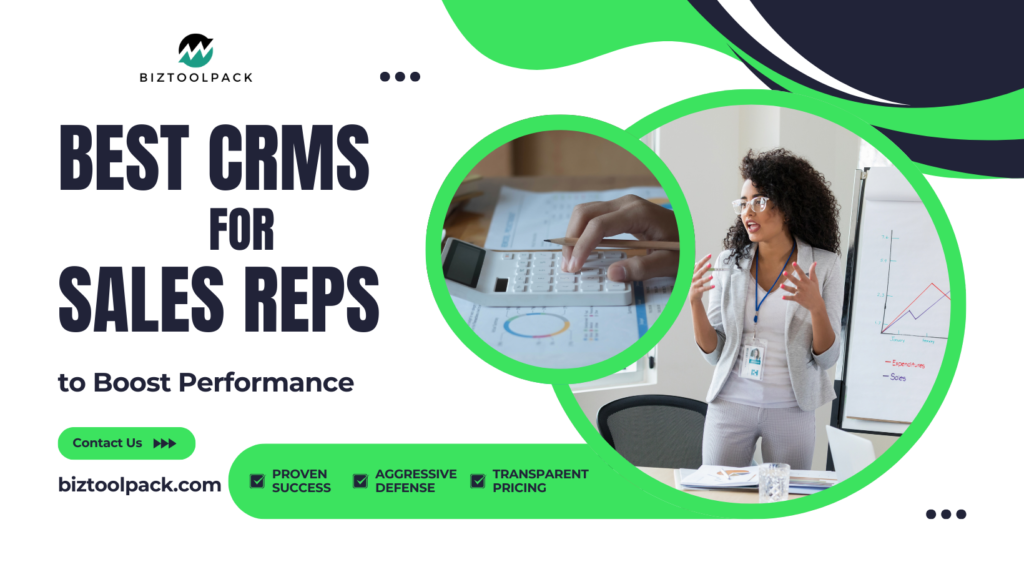Did You Know That Businesses Using a CRM System Experience a 29% Increase in Sales?
In the ever-evolving landscape of sales, staying ahead of the competition isn’t just about having a stellar product or service—it’s about building and nurturing relationships. As a seasoned CRM expert, I’ve seen firsthand how the right tools can transform a sales team’s performance. Consider this: businesses that leverage a Customer Relationship Management (CRM) system often witness a staggering 29% increase in sales. That’s not just a statistic; it’s a game-changer.
This article aims to guide you through the maze of CRM options to find the best CRM for sales reps. We’ll delve into the top solutions tailored for sales professionals, dissecting their features, pricing, and ideal use cases.
Choosing the right CRM isn’t just about adopting new software; it’s about investing in a tool that can propel your business forward. The right CRM enhances customer retention, streamlines operations, and ultimately drives revenue growth. It’s pivotal for achieving business success in today’s customer-centric marketplace.
We’ll explore key features that matter most to sales reps, compare the top CRM solutions, and provide actionable steps to help you make an informed decision. Whether you’re a small startup or an established enterprise, this comprehensive guide is designed to meet your needs.
What to Look for in a CRM for Your Business?
Scalability
As your business grows, your CRM should grow with you. Scalability ensures that the system can handle an increasing number of users and data without compromising performance. A scalable CRM adapts to your evolving needs, saving you the hassle of migrating to a new system down the line.
Ease of Use
An intuitive interface and straightforward onboarding process are critical. Sales reps are busy; they need a tool that enhances productivity without a steep learning curve. A user-friendly CRM promotes adoption and maximizes ROI.
Customization
Every business has unique workflows and requirements. A customizable CRM allows you to tailor features to fit your specific processes, from custom fields to personalized dashboards. This flexibility ensures the CRM works for you—not the other way around.
5 Best CRM Solutions for Sales Reps
1. Pipedrive CRM
Pipedrive is a sales-focused CRM designed to help sales teams visualize and manage their sales pipeline effectively. It is known for its intuitive, user-friendly interface that empowers sales reps to track leads, monitor progress, and close deals efficiently, making it an ideal tool for businesses that prioritize sales pipeline management.
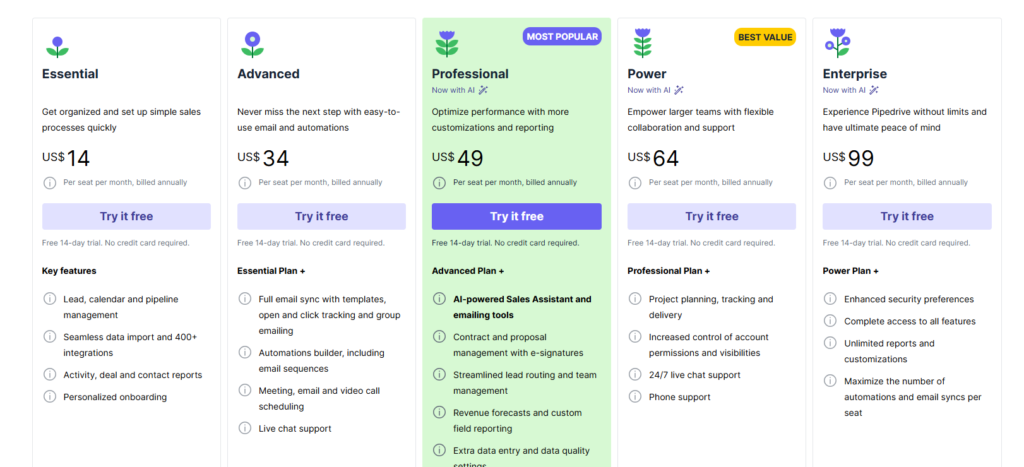
Key Features:
- Visual Sales Pipeline: Offers a clear, drag-and-drop interface that allows sales reps to track deals in different stages of the sales process, making it easy to prioritize and close more deals.
- Activity Reminders: Automatically reminds sales reps of scheduled activities, such as calls or follow-ups, helping them stay on top of their tasks.
- Email Integration: Syncs with email providers, allowing sales reps to send and track emails directly from the CRM.
- Sales Automation: Automates repetitive tasks like lead assignment, deal progression, and follow-ups, saving time and improving productivity.
- Customizable Reports: Provides insights into team performance and sales metrics with easily customizable reports and dashboards.
- Mobile App: Allows sales reps to access customer data, track deals, and update tasks on the go via the mobile app.
Pricing:
- Essential Plan: $14/month per user – Basic pipeline management and email integration.
- Advanced Plan: $34/month per user – Adds workflow automation and email tracking.
- Professional Plan: $49/month per user – Advanced features like sales forecasting, custom reports, and team goals.
- Power Plan: $64/month per user – Enhanced security, sales insights, and document management.
- Enterprise Plan: $99/month per user – Full customization, dedicated support, and advanced reporting features.
Sales reps in small to mid-sized businesses that need a simple, visual CRM to manage sales pipelines and prioritize deals. It’s especially well-suited for sales teams that want a highly intuitive tool to streamline deal tracking and close sales faster.
2. Salesforce CRM
Salesforce is one of the most widely used CRMs globally, known for its comprehensive cloud-based platform that helps businesses manage customer relationships, sales pipelines, marketing, and support services. It is highly customizable, making it adaptable to various business needs, from small businesses to large enterprises.
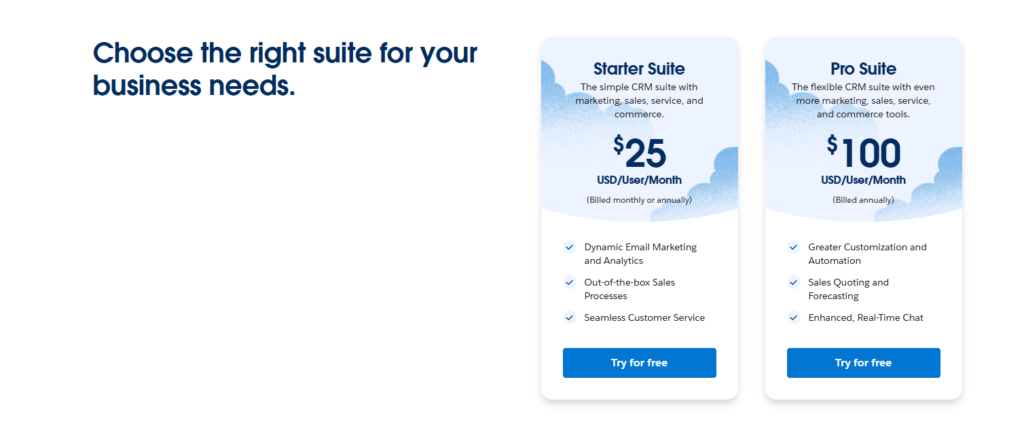
Key Features:
- Lead and Opportunity Management: Tracks leads throughout the sales funnel, allowing sales reps to prioritize deals and close more efficiently.
- Sales Forecasting: Provides real-time visibility into your sales pipeline with accurate forecasts.
- Automation Tools: Streamlines repetitive tasks, automates workflows, and improves sales productivity.
- Customizable Dashboards & Reports: Tailored reporting and data visualization help sales reps track KPIs and sales performance.
- AppExchange Integrations: Offers an extensive marketplace with thousands of third-party integrations for various business needs.
- AI-Powered Einstein Analytics: Provides predictive insights and automated recommendations for sales teams.
Pricing:
- Essentials: $25/user/month – Basic CRM features, contact management, and opportunity tracking.
- Professional: $75/user/month – Includes full CRM capabilities, standard workflows, and collaboration tools.
- Enterprise: $150/user/month – Advanced customization, workflow automation, and in-depth reporting.
- Unlimited: $300/user/month – Unlimited support, advanced features, and complete customization.
Sales reps from medium to large enterprises looking for robust features, extensive customization, and integration options. It’s ideal for businesses with complex sales processes that need detailed forecasting and analytics.
3. HubSpot CRM
HubSpot is a popular, user-friendly CRM platform designed to help businesses manage and automate their sales, marketing, and customer service processes. It offers a range of tools tailored to both small businesses and large enterprises, helping sales teams track customer interactions, manage leads, and close deals efficiently.
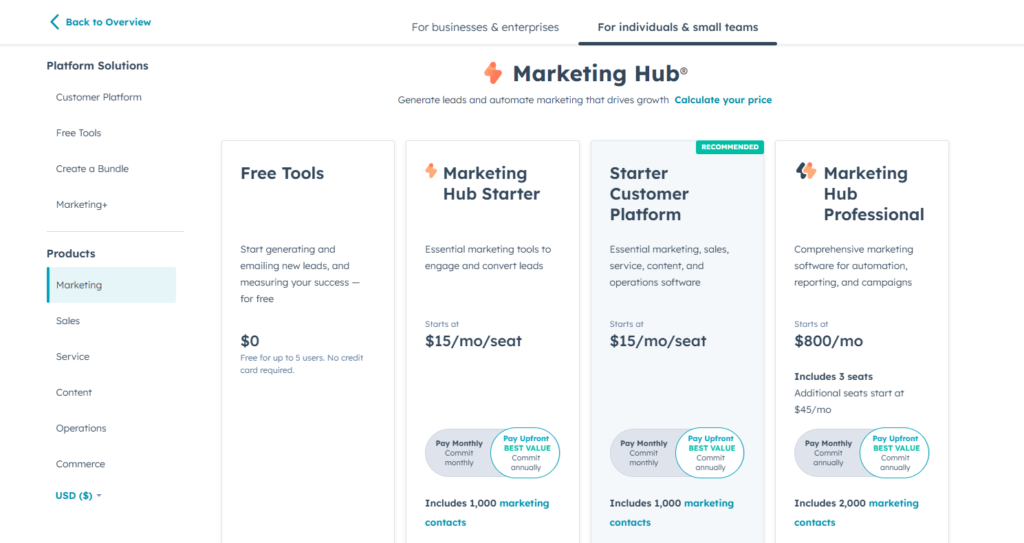
Key Features:
- Contact Management: Stores detailed customer information and tracks interactions.
- Pipeline Management: Visual sales pipelines to track deals in real-time.
- Sales Automation: Automates repetitive tasks like email follow-ups and data entry, allowing sales reps to focus on closing deals.
- Email Tracking & Templates: Notifies sales reps when prospects open emails and provides customizable templates for efficiency.
- Meeting Scheduler: Integrated calendar tools allow prospects to schedule meetings directly with sales reps.
- Reporting Dashboard: Offers deep insights into sales performance with customizable reports.
Pricing:
- Free Plan: $0 – Basic CRM, contact management, and email marketing tools.
- Starter: $15/month – Adds email marketing automation, improved customer support.
- Professional: $800/month – Advanced features like workflow automation and custom reporting.
- Enterprise: $3,600/month – Extensive customization, predictive lead scoring, and tailored support for large teams.
Sales reps from small to mid-sized companies that need a user-friendly, scalable CRM solution. It’s especially suitable for teams focused on inbound sales and customer nurturing, or for those who want a solid free-tier option.
4. Zoho CRM
Zoho CRM is a comprehensive, cloud-based platform designed to help businesses of all sizes manage their sales, marketing, and customer support activities. Known for its affordability and customization options, Zoho CRM helps sales reps build better relationships, track leads, and close deals faster.
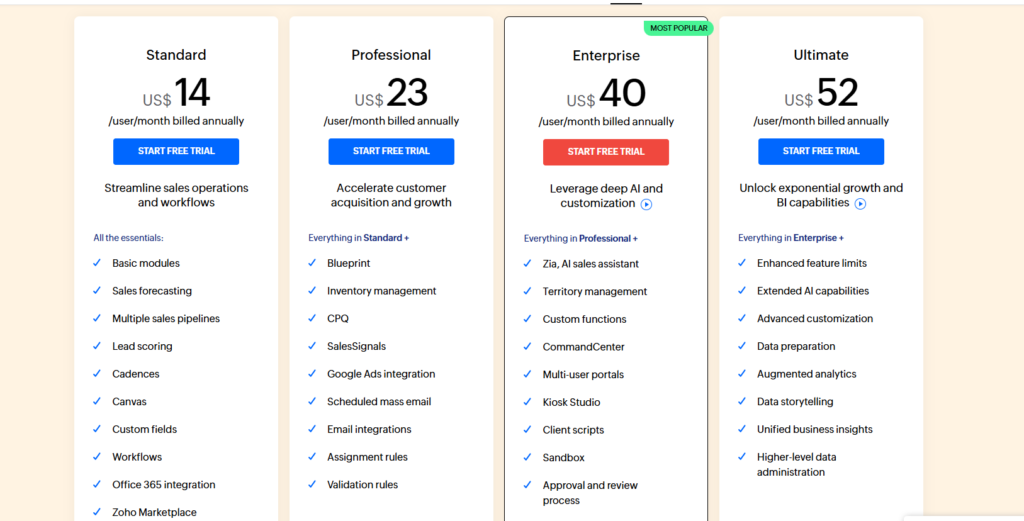
Key Features:
- Lead and Contact Management: Allows sales reps to capture, track, and manage leads across different stages of the sales funnel.
- Sales Automation: Automates repetitive tasks such as follow-ups, email campaigns, and lead scoring, allowing sales reps to focus on selling.
- Customizable Dashboards and Reports: Provides in-depth analytics and reporting tools to help sales reps track performance metrics and improve decision-making.
- Multichannel Communication: Integrates with phone, email, live chat, and social media, giving sales reps multiple ways to connect with prospects and customers.
- AI-Powered Sales Assistant (Zia): Offers sales predictions, suggests the best time to contact leads, and provides intelligent data insights.
- Mobile CRM: Sales reps can access customer data, track deals, and stay productive on the go with the mobile app.
Pricing:
- Free Plan: Available for up to 3 users – Includes basic CRM features.
- Standard: $14/user/month – Adds workflow automation, scoring rules, and integrations.
- Professional: $23/user/month – Advanced features like inventory management, validation rules, and sales forecasting.
- Enterprise: $40/user/month – Offers AI-powered features, custom modules, and multi-user portals.
- Ultimate: $52/user/month – Enhanced analytics, customization, and premium support.
Sales reps in small to mid-sized businesses who need an affordable, customizable CRM to manage leads, automate tasks, and track performance. It’s especially beneficial for teams looking to streamline sales processes and leverage AI insights to boost productivity.
5. Keap CRM
Keap (formerly Infusionsoft) is an all-in-one CRM designed to help small businesses automate their sales and marketing processes. It offers robust tools for managing customer relationships, automating follow-ups, and streamlining operations. Its primary focus is on helping sales reps nurture leads and turn them into customers through email marketing and sales automation.
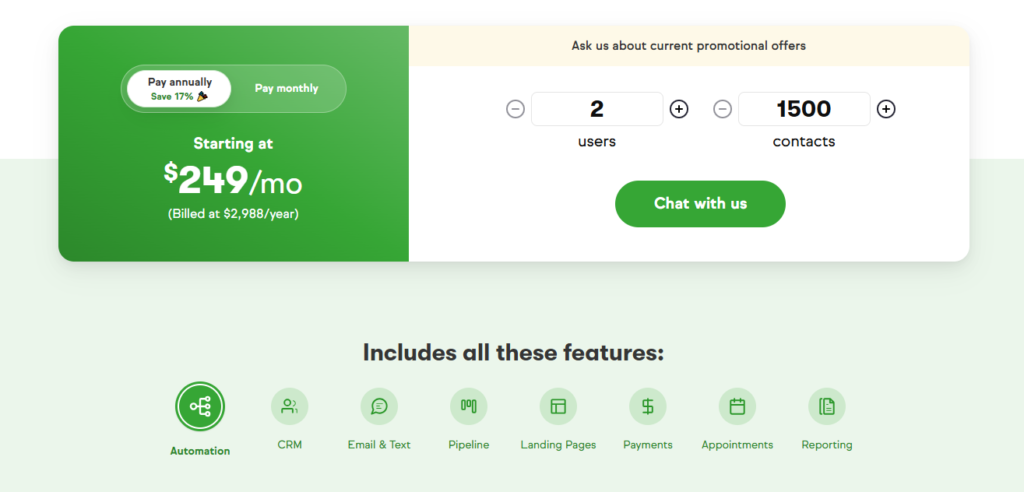
Key Features:
- Sales and Marketing Automation: Automates follow-up emails, lead nurturing, and workflow processes, freeing sales reps to focus on closing deals.
- Contact Management: Stores and tracks detailed customer information, helping sales reps manage leads and interactions efficiently.
- Email Marketing: Allows sales reps to create personalized email campaigns, automate sequences, and track open rates and engagement.
- Pipeline Management: Provides a visual pipeline to track deals and leads, ensuring that no sales opportunity is missed.
- Appointments and Payments Integration: Integrates scheduling and invoicing tools, allowing sales reps to book appointments and process payments directly from the CRM.
- Mobile App: Sales reps can manage their contacts, appointments, and follow-ups on the go with a dedicated mobile app.
Pricing:
- Pro Plan: $249/month – Includes support for up to 1,500 contacts and 2 users, along with sales automation, pipeline management, and advanced email marketing features.
Sales reps in small businesses that focus on lead nurturing, email marketing, and sales automation. It’s particularly useful for sales teams that want to automate their marketing efforts while managing customer relationships and deal pipelines. Ideal for service-based businesses looking to streamline their sales processes.
Which CRM is Best for Your Sales Team?
After extensive analysis, HubSpot CRM emerges as the best CRM for sales reps. Its robust features, scalability, and extensive customization options make it a powerhouse for sales teams aiming for growth.
Use Case Recommendations
- Startups and Small Businesses: HubSpot CRM offers a free, user-friendly platform ideal for getting started.
- Mid-Sized Enterprises: Zoho CRM strikes a balance between affordability and functionality.
- Sales-Focused Teams: Pipedrive excels in pipeline management, perfect for teams wanting a clear visual of their sales process.
- Ease of Use: Keap provides an intuitive interface, making it accessible for teams new to CRM systems.
How to Choose a CRM: A Beginner’s Buying Guide for Sales Reps
Step-by-Step Guidance
- Identify Your Business Needs
- List the challenges your sales team faces.
- Determine which CRM features can address these issues.
- Evaluate Features
- Create a checklist of must-have features.
- Compare how each CRM stacks up against your list.
- Consider Budget Constraints
- Set a clear budget.
- Factor in hidden costs like training or add-ons.
- Assess Customer Support
- Check the availability and quality of support.
- Read reviews to gauge customer satisfaction.
- Test the CRM
- Utilize free trials.
- Involve your team in the testing process.
- Check Integration Capabilities
- Ensure compatibility with existing tools.
- Look for APIs or integration marketplaces.
- Scalability
- Consider future growth.
- Choose a CRM that can scale with your business.
- Security Measures
- Verify data encryption and compliance certifications.
- Ask about data backup and recovery plans.
- Customization Options
- Evaluate how easily you can tailor the CRM.
- Check for customizable fields, workflows, and dashboards.
- Make an Informed Decision
- Review all gathered information.
- Choose the CRM that best aligns with your goals.
Conclusion
Selecting the best CRM for sales reps is a crucial decision that impacts your team’s efficiency and your business’s bottom line. We’ve explored key considerations, reviewed top CRM solutions, and provided a step-by-step guide to help you make the right choice.
Remember, the goal is to find a CRM that not only meets your current needs but also adapts to future challenges. Consider long-term goals and scalability when making your decision.
FAQs
1. Do I Really Need a CRM?
Absolutely. A CRM centralizes customer data, streamlines your sales process, and enhances team collaboration—all essential for increasing sales and customer satisfaction.
2. How Secure Is My Data in a CRM?
Most reputable CRMs employ advanced security measures, including encryption and regular backups. Always check for compliance certifications like GDPR or ISO standards.
3. Can a CRM Integrate with My Existing Tools?
Yes, most CRMs offer integrations with email clients, marketing automation platforms, and other business tools to create a seamless workflow.
4. What Is the Cost of Implementing a CRM System?
Costs vary widely, from free options like HubSpot CRM to premium plans costing hundreds per user per month. Consider both upfront and ongoing costs.
5. How Long Does It Take to Set Up a CRM?
Implementation can range from a few hours to several weeks, depending on the complexity of your needs and the CRM’s capabilities.
6. Is Training Required to Use a CRM?
While many CRMs are user-friendly, training ensures your team maximizes the tool’s potential, leading to better adoption and ROI.
7. Can I Customize the CRM to Fit My Business?
Most CRMs offer customization options, from custom fields to workflow automation, allowing you to tailor the system to your processes.
8. What Support Options Are Available?
Support varies but often includes email, phone, live chat, and extensive online resources. Some offer dedicated account managers for higher-tier plans.
9. Will a CRM Help Increase Sales?
Yes, by improving lead management, customer communication, and data analysis, a CRM can significantly boost sales performance.
10. Are There Free CRM Options Available?
Yes, CRMs like HubSpot CRM offer free plans with basic features, perfect for small businesses or those new to CRM systems.
By following this guide, you’re well on your way to finding the best CRM for sales reps that fits your unique business needs. Happy selling!
I’m Palash Pramanik, an SEO and CRM expert with a deep passion for helping businesses thrive online. I specialize in driving higher search engine rankings and creating seamless customer relationship management strategies to enhance both visibility and engagement. Whether you need to boost your online presence, attract the right audience, or streamline your client interactions, I offer tailored solutions designed to meet your specific needs. My goal is to help you optimize your digital strategy, strengthen customer connections, and drive sustainable growth. Let’s work together to elevate your business to new heights!

